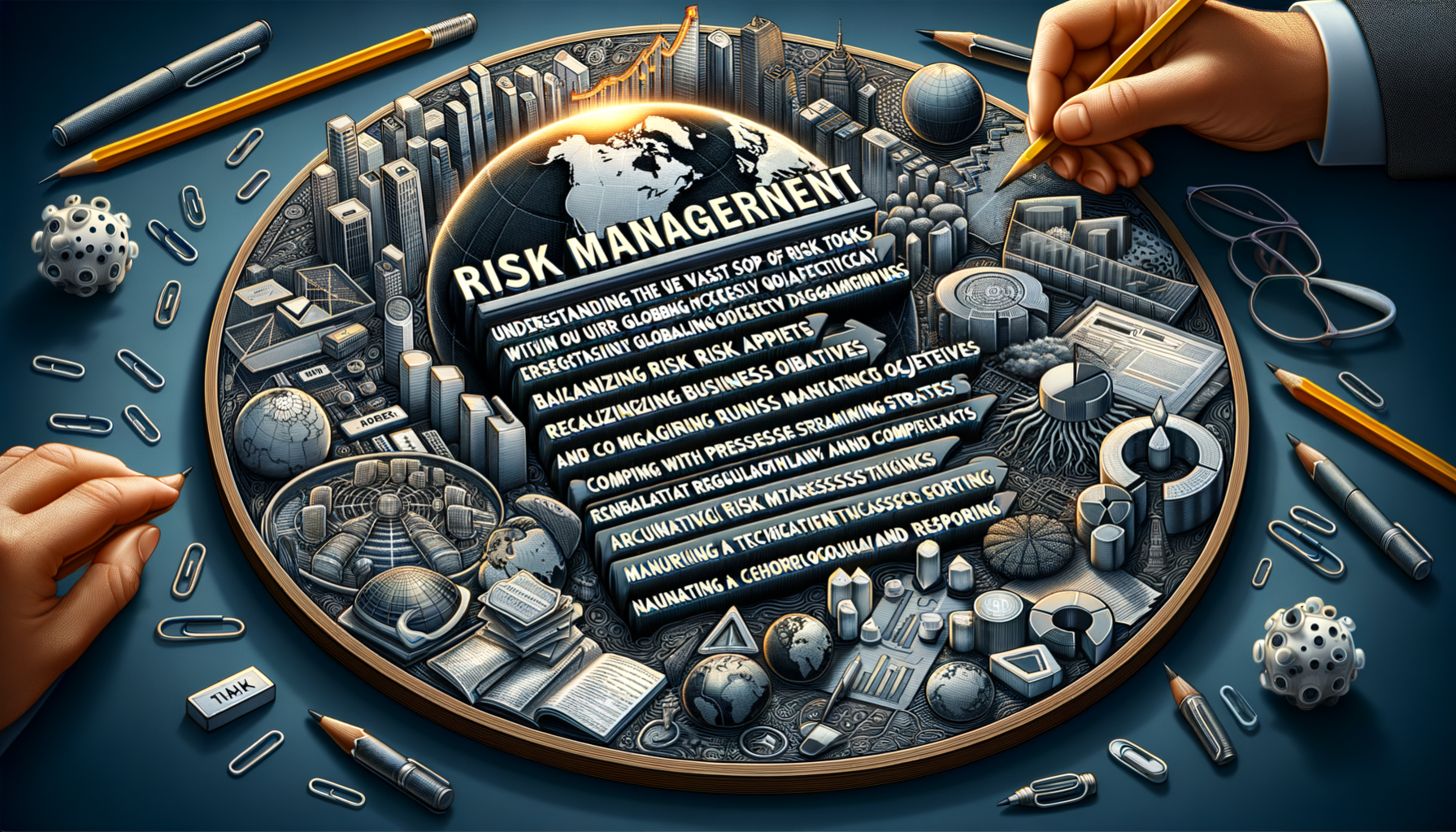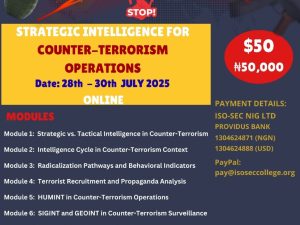Comprehensive Risk Management: Navigating Modern Challenges and Strategies
- Description
- Curriculum
- Reviews

Risk Management Challenges Course
Understanding the Scope of Risk Management Today
Risk management has evolved significantly, becoming an integral part of strategic planning. This module covers the expanding scope of risk management, emphasizing its role in identifying, assessing, and mitigating potential threats across various sectors. Students will understand the criticality of implementing robust risk management frameworks that align with organizational goals.
Identifying Emerging Risks in a Globalized World
As globalization intensifies, new risks emerge that challenge conventional management strategies. This section explores how economic, political, and environmental factors contribute to complex risk landscapes. Learners will gain insights into early detection of emerging risks and the importance of leveraging data analytics and global intelligence for proactive risk identification.
Balancing Risk Appetite with Business Objectives
Achieving a balance between risk appetite and business objectives is crucial for sustainable growth. This module discusses strategies for defining risk tolerance levels while ensuring alignment with strategic goals. Participants will learn how to make informed decisions that drive innovation without compromising the organization’s stability.
Integrating Risk Management Across Departments
Effective risk management requires a unified approach across all organizational departments. This section focuses on techniques for fostering collaboration and communication between different units to create a cohesive risk management culture. Participants will explore best practices for integrating risk management processes into everyday operations to enhance resilience and agility.
Dealing with Regulatory and Compliance Pressures
Organizations face increasing regulatory scrutiny, making compliance a top priority. This module covers the challenges posed by stringent regulations and offers strategies for maintaining compliance while minimizing operational disruptions. Learners will understand the significance of staying updated with regulatory changes and implementing comprehensive compliance programs.
Managing Technological and Cybersecurity Risks
Technological advancements introduce new vulnerabilities, making cybersecurity a critical aspect of risk management. This section delves into identifying and mitigating technological risks, including data breaches and cyber-attacks. Participants will explore best practices for establishing robust security protocols and fostering a culture of cybersecurity awareness.
Ensuring Accurate Risk Assessment and Reporting
Accurate risk assessment and reporting are fundamental to effective risk management. This module provides guidance on developing reliable risk assessment methodologies and improving transparency in risk communication. Learners will gain skills in utilizing advanced tools and technologies to enhance accuracy in risk measurement and reporting.
Building a Resilient and Adaptive Risk Culture
Creating a resilient risk culture is essential for navigating uncertainties. This final section emphasizes the importance of fostering an adaptive risk culture that encourages continuous learning and improvement. Participants will learn how to cultivate an environment that supports open dialogue, accountability, and proactive risk management behaviors.
By the end of this course, learners will have a comprehensive understanding of the multifaceted challenges in risk management and be equipped with the strategies to address them effectively within their organizations.
-
1Introduction to Risk Management FrameworksIn this lesson, "Understanding the Basics of Risk Management Frameworks," students will explore the foundational concepts of risk management frameworks and their critical role in safeguarding organizational assets. Participants will learn to identify, assess, and prioritize risks, while gaining insights into various frameworks such as NIST, ISO 31000, and COSO, equipping them with the skills to effectively manage risks in diverse environments.
-
2Historical Evolution of Risk Management PracticesIn this engaging lesson, "Tracing the Timeline: The Evolution of Risk Management Practices," students will explore the historical development of risk management, from its early beginnings to modern-day practices. Learners will gain insights into key milestones, influential theories, and pivotal changes that have shaped how organizations identify, assess, and mitigate risks across various industries.
-
3Case Study Analysis: Exploring Risk Management Strategies
-
4Globalization and Its Impact on RiskIn this lesson, students will explore the multifaceted impact of globalization on international risk management, identifying both challenges and opportunities it presents. Through engaging discussions and case studies, learners will gain insights into how global interconnectivity influences economic, political, and environmental risks, and develop strategies to navigate these complexities effectively.
-
5Spotting Emerging Risks in Dynamic MarketsIn this lesson, "Identifying Emerging Risks in Dynamic Markets," students will learn to analyze and interpret market trends to spot potential risks before they become critical issues. By understanding key indicators and applying strategic foresight, participants will be equipped to make proactive decisions and maintain a competitive edge in ever-changing market environments.
-
6Analyzing Risk Identification Strategies in Global Markets
-
7Defining Risk Appetite and ToleranceIn this lesson on "Understanding and Defining Risk Appetite and Tolerance," students will explore the critical concepts of risk appetite and risk tolerance, learning how to effectively define and differentiate between them. Through engaging discussions and practical examples, participants will gain the skills to assess and align organizational risk strategies with business objectives, ensuring a balanced approach to risk management.
-
8Aligning Risk Strategy with Business GoalsIn this lesson, students will explore how to effectively align risk management strategies with overarching business objectives, ensuring a cohesive and resilient organizational approach. By analyzing real-world case studies and engaging in strategic exercises, participants will learn to identify, assess, and integrate risk considerations into their decision-making processes, ultimately enhancing their ability to safeguard business success.
-
9Video: Real-world Examples of Risk BalanceIn this lesson, students will explore the concept of risk balance through engaging video examples that illustrate real-world scenarios. By analyzing these situations, learners will gain insights into how individuals and organizations assess and manage risk, enhancing their ability to make informed decisions in various contexts.
-
10Cross-Functional Risk Management CoordinationIn this lesson, students will explore strategies to enhance collaboration across different departments in the realm of risk management, fostering a more cohesive organizational response to potential threats. Participants will learn how to identify and bridge communication gaps, utilize diverse skill sets, and leverage collective expertise to develop a robust cross-functional risk management framework.
-
11Workshop Assignment: Crafting Comprehensive Departmental Risk Plans
-
12Stream: Panel Discussion with Risk ManagersIn this engaging panel discussion, students will gain valuable insights into risk management by learning directly from seasoned industry experts. They will explore various strategies for identifying, assessing, and mitigating risks, while also understanding the real-world challenges and solutions faced by risk managers in diverse sectors.
-
13Understanding Regulatory EnvironmentsIn this engaging lesson, "Navigating Regulatory Environments: A Comprehensive Guide," students will explore the complex world of regulatory frameworks and their impact on businesses. Participants will gain a thorough understanding of key regulatory concepts, learn how to effectively comply with legal requirements, and develop strategies to navigate these environments successfully.
-
14Compliance Best PracticesIn "Mastering Compliance: Essential Best Practices for Success," students will explore key strategies and techniques to ensure adherence to regulatory standards across various industries. This engaging lesson will empower learners with practical tools to identify potential compliance risks, develop effective compliance programs, and foster a culture of ethical decision-making within their organizations.
-
15Quiz: Key Compliance Concepts
-
16Technological Risks in Modern EnterprisesIn this lesson, students will explore the diverse landscape of technological risks that modern enterprises face and learn strategies to effectively identify, assess, and mitigate these challenges. Through engaging discussions and practical case studies, participants will gain insights into the evolving nature of technology in business and how to safeguard against potential disruptions.
-
17Video: Cybersecurity Threats and SolutionsIn this engaging lesson on cybersecurity, students will explore the various types of cyber threats and gain a comprehensive understanding of their impact on digital security. Through an informative video, learners will identify key vulnerabilities and learn effective strategies to implement robust security solutions, empowering them to protect themselves and their organizations from potential cyber-attacks.
-
18Creating a Comprehensive Cyber Risk Mitigation Strategy
-
19Frameworks for Risk AssessmentIn this lesson, students will explore comprehensive frameworks for effective risk assessment, gaining insights into identifying, analyzing, and mitigating potential risks within various contexts. Through practical examples and case studies, learners will develop the skills necessary to implement these frameworks effectively, enhancing their ability to make informed decisions and ensure organizational resilience.
-
20Tools for Effective Risk ReportingIn this lesson, "Mastering Tools for Effective Risk Reporting," students will explore a range of essential tools and techniques to enhance their risk reporting skills. Participants will learn to analyze and present risk data effectively, enabling them to communicate insights clearly to stakeholders and support informed decision-making.
-
21Comprehensive Risk Report: Analysis and Strategy Development
-
22Key Elements of A Resilient Risk CultureIn this lesson, students will explore the fundamental elements that contribute to building a resilient risk culture within organizations. They will learn how to identify potential risks, implement effective risk management strategies, and foster an environment where proactive risk assessment is integral to success. By the end of the session, participants will be equipped to enhance their organization's resilience through informed and strategic risk culture practices.
-
23Strategies for Cultivating AdaptabilityIn "Mastering Adaptability: Strategies for Thriving in Change," students will explore practical strategies to enhance their flexibility and resilience in evolving environments. Through engaging activities and insightful discussions, learners will develop skills to navigate change confidently, turning potential challenges into opportunities for growth and success.
-
24Final Quiz: Comprehensive Risk Management









